Everest Base Camp Trek for Beginners
- 16 Breakfast
- 13 Lunch
- 13 Dinner
- The Everest Hotel in Kathmandu
- Lodge during the trek
- Trekking
- Sightseeing
- Helicopter Ride
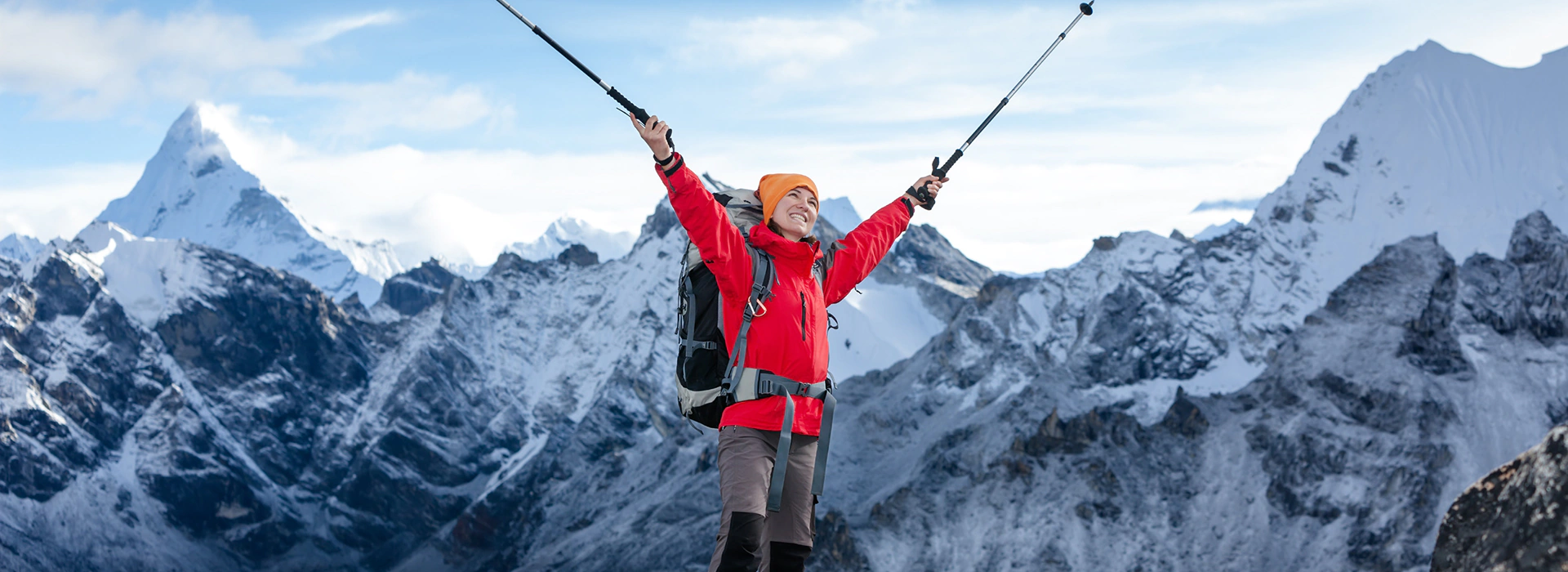
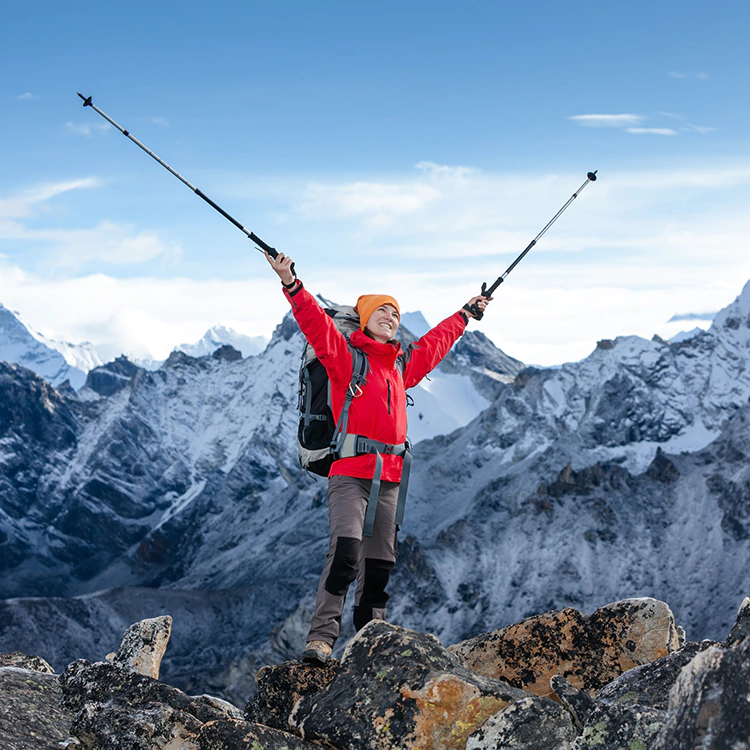
The 17-day Everest Base Camp Trek for Beginners is a remarkable adventure designed for trekkers without previous experience or those seeking a memorable journey in the Everest region. Embarking from Kathmandu and culminating in Gorak Shep, this trek presents an extraordinary adventure, granting trekkers the remarkable chance to reach the base camp of the majestic Mount Everest and bask in the awe-inspiring panorama from the renowned viewpoint of Kala Patthar.
Embarking on an exhilarating flight from Kathmandu to Lukla, the trek commences with a journey to Phakding and Monjo, where trekkers are instantly captivated by the awe-inspiring landscapes and serene ambiance that envelops the surroundings.
As you ascend, the trail leads to the vibrant Sherpa capital of Namche Bazaar, offering a glimpse into the unique mountain culture and a chance to acclimatize. Continuing the journey, you’ll pass through picturesque villages like Phungi Thanga, Debuche, and Somare, each with charm and beauty.
The trek gradually ascends, with Dingboche serving as an acclimatization hub to prepare your body for the higher altitudes. From there, the trail leads to Dughla or Thokla, where you’ll find memorials honoring mountaineers who have braved the Everest region. As you approach Lobuche, the majestic peaks of Everest, Nuptse, and other giants dominate the horizon, filling you with awe and inspiration.
Gorak Shep becomes your final resting place before the highlight of the journey. An early morning trek to Kala Patthar offers a breathtaking sunrise panorama of the Everest region, where you’ll witness the first rays of sunlight caressing the towering peaks.
The adventure culminates with a trek to Everest Base Camp, a sacred ground where mountaineers prepare for their summit attempts. Surrounded by the Himalayan giants and prayer flags fluttering in the wind, you’ll bask in the triumph of reaching this iconic destination.
The journey concludes with a scenic helicopter flight back to Kathmandu, providing a spectacular aerial view of the mountains and a chance to reflect on the incredible experience. Experienced guides will accompany you during the hike, prioritizing your well-being and providing valuable insights about the area and its cultural heritage.
Comfortable accommodations and hearty meals await you at each stop, ensuring a rejuvenating experience after each day’s adventure. The Everest Base Camp Trek for beginners is a life-changing journey, allowing you to challenge yourself, witness unparalleled natural beauty, and immerse yourself in the rich Sherpa culture. It’s an opportunity to create memories that will last a lifetime and return home with a deep appreciation for the magnificence of the Himalayas.
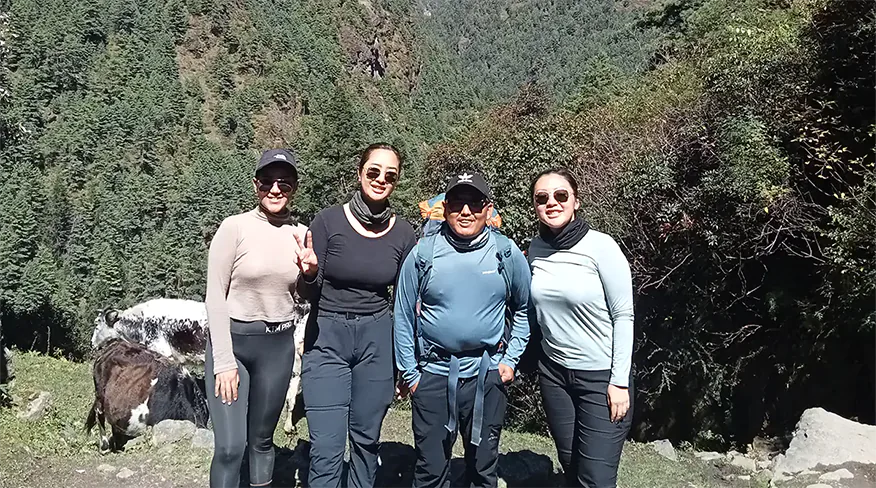
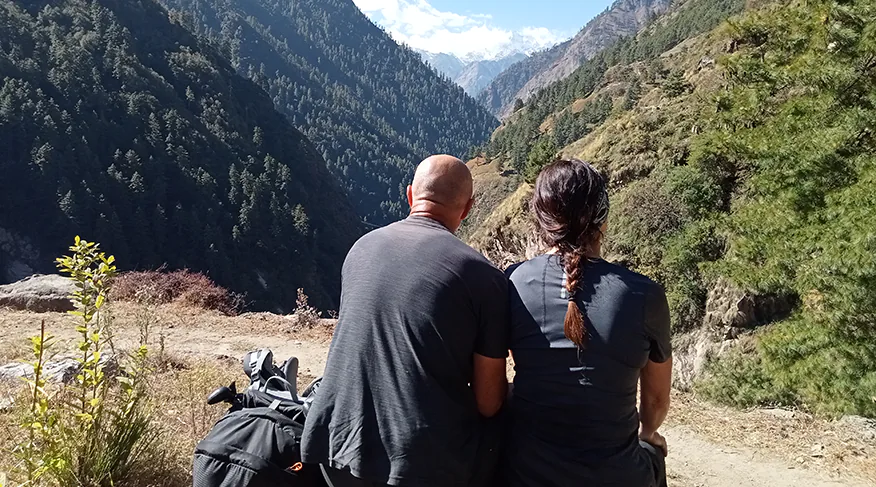
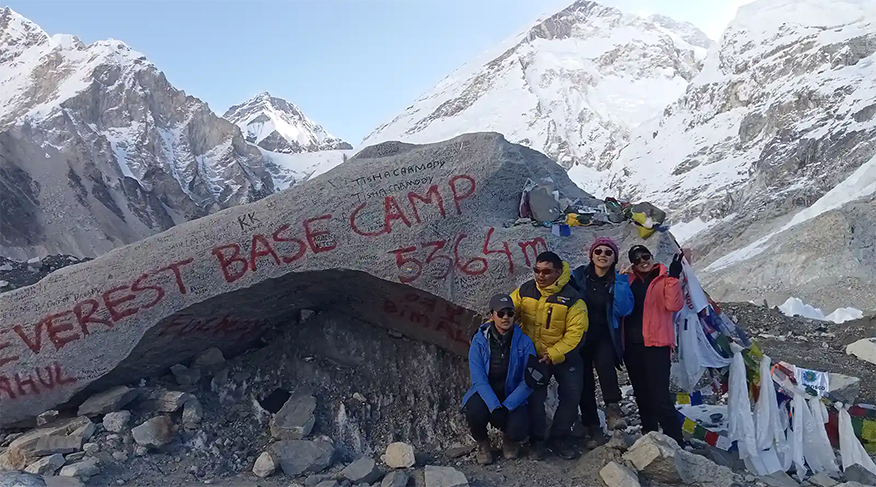
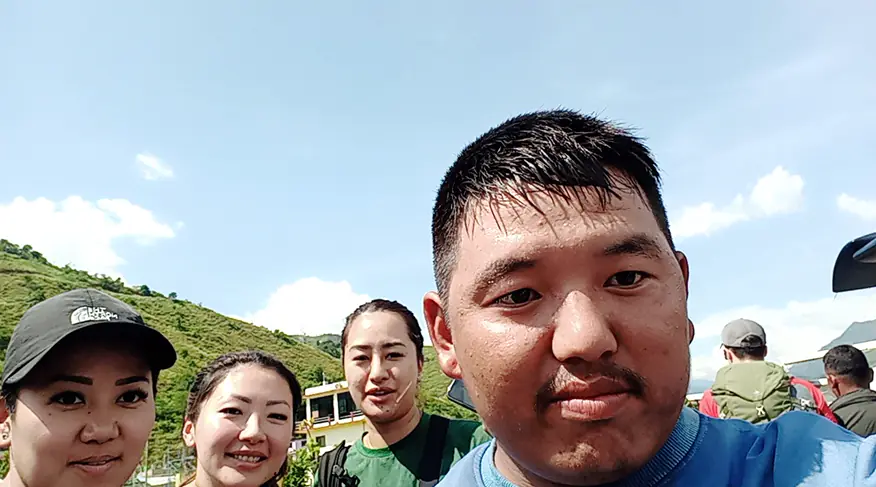
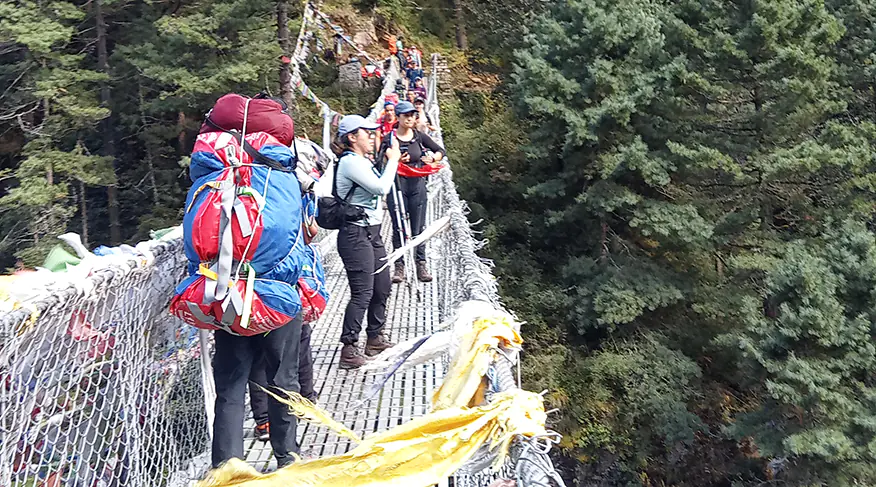
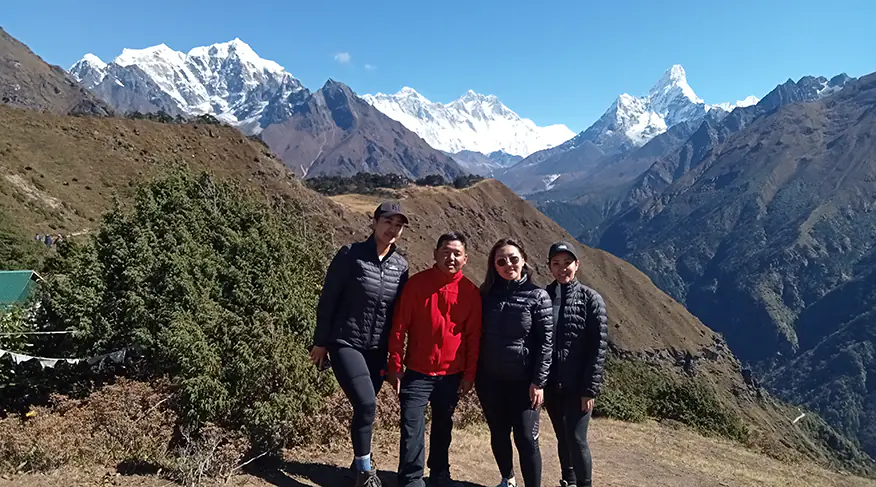
Everest Base Camp Trek for Beginners
A representative from Peregrine will arrange for your transportation from Kathmandu Airport to the Everest Hotel. Please provide us with your flight details and number to avail of this service. If you are already in Kathmandu, kindly inform us of your hotel name so we can pick you up there.
We will provide a brief Everest Base Camp Trek for Beginners orientation session in the evening. Additionally, we will also inspect your trekking equipment. If you are missing any necessary equipment, you will have the option to purchase it in Kathmandu.
Accommodation: The Everest Hotel
Your journey of Everest Base Camp Trek for Beginners begins with an exhilarating flight from Kathmandu to Lukla, a small mountain airstrip serving as the Everest region’s gateway. Upon reaching your destination, you can meet your trekking crew and commence your journey toward Phakding.
The trail descends through lush green landscapes, passing through small Sherpa villages and terraced fields. Indulge in the tranquil ambiance and fully immerse yourself in the rich local culture, relishing every moment of the experience.
Along the way, you’ll encounter prayer wheels, colorful prayer flags, and Buddhist monasteries that showcase the region’s spiritual side. After several hours of trekking, one will arrive at Phakding, a serene village encompassing majestic mountains. Take a moment to settle into your lodging, indulging in a gratifying repose and relishing the excitement of your forthcoming expedition.
Meals: Breakfast, Lunch, and Dinner
Accommodation: Local Lodge
Today’s trek takes you deeper into the heart of the Everest region. Leaving Phakding behind, you’ll continue along the Dudh Koshi River trail. Crossing suspension bridges adorned with prayer flags, you’ll meander through lush rhododendron and pine forests.
The trail offers glimpses of snow-capped peaks, adding to the awe-inspiring scenery. During your ascent, you will traverse through charming Sherpa settlements, granting you a fascinating glimpse into the authentic local way of life. After an arduous trek of several hours, you will find yourself in Monjo, a delightful village outside Sagarmatha National Park’s boundaries.
This charming settlement offers a perfect respite where you can fulfill the obligatory entry procedures for the park and seize the chance to replenish your energy and revitalize yourself for the journey ahead. Enjoy the tranquil surroundings, enjoy the breathtaking views, and indulge in delicious Sherpa cuisine.
Monjo is renowned for its warm hospitality, where the amiable locals extend a heartfelt welcome, making you feel right at home. Nepal presents a unique opportunity to fully embrace the serene ambiance of the majestic Himalayas, allowing you to prepare yourself for the exhilarating adventures that lie ahead.
Meals: Breakfast, Lunch, and Dinner
Accommodation: Local Lodge
Leaving Monjo, you’ll continue your ascent through dense rhododendron and pine forests. The trail gradually climbs, offering occasional glimpses of Everest and other stunning peaks. You will enter a UNESCO World Heritage Site by crossing the iconic Hillary Suspension Bridge, a gateway to the breathtaking Sagarmatha National Park.
This region is renowned for its rich biodiversity, boasting a plethora of diverse flora and fauna, including rare Himalayan wildlife. As you ascend further, you’ll reach Namche Bazaar, a bustling Sherpa town and the commercial hub of the Everest region.
In Namche Bazaar, you can delve into the lively local market, wander through its vibrant stalls, and discover unique souvenirs. Immerse yourself in the fascinating Sherpa culture that permeates the surroundings. Enjoy your overnight stay in Namche Bazaar, soaking in the delightful experiences it has to offer.
Meals: Breakfast, Lunch, and Dinner
Accommodation: Local Lodge
Acclimatization plays a vital role in adapting to the high altitude. Today, you have a rest day in Namche Bazaar, allowing you to engage in gentle activities. Spend the day exploring the town and its environs, hiking to the Everest View Hotel situated at a higher elevation.
From there, behold the awe-inspiring panoramic vistas of Everest, Lhotse, Ama Dablam, and other majestic peaks. Additionally, you can visit the Sherpa Cultural Museum or converse with the amiable locals to gain insights into their traditions and way of life.
Namche Bazaar offers a range of cafes, bakeries, and shops, so take the opportunity to relax, savor some delicious local cuisine, and prepare for the upcoming days of trekking. Overnight in Namche Bazaar.
Meals: Breakfast, Lunch, and Dinner
Accommodation: Local Lodge
As you depart from Namche Bazaar, the trail meanders downhill, leading you toward the Dudh Koshi River. Along the way, you’ll traverse suspension bridges, traverse through enchanting rhododendron forests, and pass by picturesque Sherpa villages.
Throughout this portion of the trek, you’ll be treated to breathtaking vistas of Everest and the surrounding majestic peaks. Continuing the descent, you’ll eventually arrive at Phungi Thanga, a tranquil haven alongside the rushing river. This peaceful settlement provides an ideal setting for rest and rejuvenation before resuming your remarkable journey.
Meals: Breakfast, Lunch, and Dinner
Accommodation: Local Lodge
Continuing your trek, you will gradually ascend through captivating rhododendron and pine forests, immersing yourself in the breathtaking beauty of the natural surroundings. Along this remarkable path, a true highlight awaits the awe-inspiring Tengboche Monastery, an esteemed spiritual hub in the region.
As you reach this magnificent landmark, an expansive vista unfolds, offering panoramic views of Everest, Ama Dablam, and other majestic peaks that command the horizon. The juxtaposition of these towering giants against the tranquil Himalayan backdrop creates an enchanting spectacle that etches a lasting impression on your journey to Everest Base Camp.
Following a brief descent, the trail ascends again, leading you to Debuche, a picturesque village adorned with vibrant prayer flags. Nestled in this serene setting, you can embrace the spiritual ambiance and witness the rich Sherpa culture that flourishes here. Immerse yourself in the tranquility of Debuche as you spend the night cherishing the experiences and memories that continue to shape your expedition.
Meals: Breakfast, Lunch, and Dinner
Accommodation: Local Lodge
As you ascend to higher altitudes, the landscapes transform into rugged, awe-inspiring vistas. The trail winds through dense forests, revealing breathtaking panoramas of the area’s majestic peaks.
As you journey, you’ll traverse traditional Sherpa villages, offering a glimpse into their distinctive way of life and the deep-rooted spirituality that permeates the region. The picturesque village of Somare awaits, offering a serene atmosphere and remarkable mountain views. Indulge in the peaceful surroundings of Somare as you spend a memorable night at this serene location.
Meals: Breakfast, Lunch, and Dinner
Accommodation: Local Lodge
Leaving Somare, you’ll continue your ascent towards Dingboche, a beautiful village in the Khumbu Valley. During your trek, you will be treated to awe-inspiring vistas of the majestic peaks, such as Ama Dablam and Island Peak. As you go to Dingboche, you will observe the distinctive landscape adorned with stone-walled fields, adding a unique charm to the village.
Dingboche is a crucial acclimatization stop, allowing your body to adjust to the high altitude, ensuring a safe and comfortable journey. The mesmerizing views and the tranquil ambiance of Dingboche will leave a lasting impression as you take the time to acclimate.
Use this day to explore the stunning surroundings, embark on short hikes for better acclimatization, or unwind and soak in the breathtaking mountain vistas. Rest and rejuvenate in Dingboche for an overnight stay.
Meals: Breakfast, Lunch, and Dinner
Accommodation: Local Lodge
Today’s significance lies in acclimatization, enabling your body to adapt gradually to the high altitude conditions for a more comfortable and safe trek. Dingboche, situated strategically, provides a remarkable vantage point to behold the breathtaking panoramic views of the surrounding peaks, including the magnificent Ama Dablam and Island Peak.
Take this opportunity to immerse yourself in the awe-inspiring beauty of the Himalayas and allow your body to acclimatize, ensuring a safe and enjoyable trek ahead. You can take a short hike to higher elevations, such as Nagarjun Hill or Chhukung Valley, to aid in acclimatization and enjoy breathtaking vistas.
Alternatively, you can explore the village, interact with the local Sherpa community, or relax and rejuvenate amidst the serene mountain ambiance.
Meals: Breakfast, Lunch, and Dinner
Accommodation: Local Lodge
Leaving Dingboche, the trail leads you towards Dughla or Thokla, depending on the route chosen. The path takes you through alpine landscapes with scattered vegetation and offers awe-inspiring views of snow-capped peaks. Dughla is a small village situated in a valley, while Thokla is known for its memorials honoring mountaineers who lost their lives in the Everest region. Dughla provides a perfect spot to rest and reflect on the challenges and triumphs of mountain climbing overnight in Dughla or Thokla.
Meals: Breakfast, Lunch, and Dinner
Accommodation: Local Lodge
As you press on with your expedition, your path will lead you along the lateral moraine of the Khumbu Glacier, unveiling a captivating adventure. The trail gradually ascends, and you’ll witness the dramatic glacial landscapes.
As you approach Lobuche, the views become more breathtaking, with Everest, Nuptse, and other prominent peaks dominating the horizon. Lobuche is a small settlement nestled in the shadow of these majestic giants, offering a cozy resting place for trekkers. Take time to soak in the mesmerizing surroundings and prepare for the final push towards Everest Base Camp. Meals: Breakfast, Lunch, and Dinner
Accommodation: Local Lodge
As you depart from Lobuche, your path will take you towards Gorak Shep, the final settlement before reaching the legendary Everest Base Camp. The trail weaves through challenging and icy terrain, granting occasional glimpses of the awe-inspiring Khumbu Glacier.
Drawing closer to Gorak Shep, the majestic peaks of Pumori and Nuptse come into focus, commanding your attention with their breathtaking presence. Prepare yourself for a remarkable journey as you approach Gorak Shep, where the beauty of the surrounding peaks reaches its pinnacle.
Upon arrival, you’ll settle into your accommodation and take some time to rest and prepare for the upcoming adventures.
Meals: Breakfast, Lunch, and Dinner
Accommodation: Local Lodge
Today will be truly unforgettable as you journey towards two remarkable destinations. Early in the morning, you’ll embark on a challenging hike to Kala Patthar, a renowned viewpoint that offers panoramic vistas of the Himalayan giants, including Everest, Lhotse, and Makalu.
As the sun rises and casts its golden light upon the snow-capped peaks, you’ll be captivated by the enchanting beauty and ethereal ambiance it creates. After capturing the breathtaking views, you’ll descend from Kala Patthar and continue your trek to Everest Base Camp.
The trail guides you through the mesmerizing expanse of the Khumbu Glacier, providing an up-close encounter with the renowned base camp where courageous mountaineers prepare for their Everest expeditions. As you traverse this legendary path, surrounded by majestic peaks and colorful prayer flags, you’ll feel the immense significance of standing at the heart of mountaineering history.
After immersing yourself in the awe-inspiring atmosphere of Everest Base Camp, relishing a profound sense of accomplishment, and capturing precious memories, you will embark on your return journey, retracing your steps back to Gorak Shep. You will spend the night in Gorak Shep, cherishing the day’s experiences.
Meals: Breakfast, Lunch, and Dinner
Accommodation: Local Lodge
As your remarkable trek draws closer, you can board a helicopter for a breathtaking scenic flight back to Kathmandu. The helicopter ride offers a bird’s-eye view of the vast Himalayan landscape, allowing you to appreciate the region’s grandeur from a different perspective.
As you bid farewell to the Everest region, the memories of your incredible journey will be etched in your heart and mind. Upon arrival in Kathmandu, you will be greeted and quickly taken to your accommodation.
Take this time to unwind, rejuvenate, and reflect on the incredible journey you have just accomplished in the Everest region. Take this opportunity to explore the vibrant streets of Kathmandu, visit cultural sites, indulge in delicious Nepalese cuisine, and extend your stay to immerse yourself further in the rich heritage of this enchanting city.
This concludes your 17-day Everest Base Camp Trek, an extraordinary journey that has taken you through diverse landscapes, introduced you to the warm Sherpa culture, and allowed you to witness the awe-inspiring beauty of the Himalayas.
Meals: Breakfast
Accommodation: The Everest Hotel
Today is a spare day in Kathmandu for you to enjoy. In the event of unfavorable weather conditions preventing your flight, you have the option to use this day to return from Gorakshep. If you are feeling energetic and not too tired, you can visit Bhaktapur Durbar Square and Pashupatinath for sightseeing.
Meals: Breakfast
Accommodation: The Everest Hotel
Today, there are no scheduled activities planned for you. However, several options are available if you want to extend your trip. You can enjoy additional sightseeing in Kathmandu, explore the sights of Pokhara, or go on a thrilling Chitwan Jungle Safari.
If you decide to fly back to your home country or another destination, we will ensure you receive airport drop-off service according to your flight schedule.
Meals: Breakfast
To fully appreciate and conquer the challenges of the Everest Base Camp Trek for Beginners, possessing a good fitness level and prior trekking experience is crucial, making it an exhilarating adventure worth undertaking. While prior trekking experience is not mandatory, participants should have a satisfactory level of physical fitness and be mentally prepared for the challenges of trekking in the Himalayas.
The Everest Base Camp Trek is moderate to challenging and requires good fitness and some prior experience. It involves walking for several hours daily on uneven terrain, ascending and descending steep inclines, and navigating through rocky paths.
The altitude gain is significant, reaching a maximum elevation of 5,364 meters (17,598 feet) at Everest Base Camp. Before setting off on the trip, it is crucial to be in shape and build up your stamina to handle the rigors of the journey.
Building stamina and strength through hiking, jogging, and cycling can enhance your trekking experience. While the trek can be physically demanding, it is manageable with the support of experienced guides and porters who accompany you throughout the journey.
They will provide guidance, ensure your safety, and offer assistance when needed. The carefully designed itinerary incorporates dedicated acclimatization days, providing ample time to adjust to the increasing altitude and reduce the chances of experiencing altitude sickness.
To fully enjoy the trek, it is recommended to maintain a steady pace, stay adequately hydrated throughout the journey, and attentively listen to your body’s signals and needs. Take breaks when necessary and use the provided rest days for acclimatization.
By adhering to these guidelines and benefiting from the expertise of your experienced trekking team, you will be equipped to overcome challenges and maximize your enjoyment of the incredible Everest Base Camp adventure. The EBC Trek is a physically challenging but enriching experience for those seeking an unforgettable Himalayan adventure.
The timing of your Everest Base Camp Trek is crucial for a successful and enjoyable journey. Primary hiking months are March through May and September through November. It would help if you decided which season is best for your trek based on your preferences and priorities.
Spring is a popular season for hiking to Everest Base Camp due to its pleasant weather, clear skies, and stunning scenery. The trekking trail is adorned with beautiful rhododendrons and other flowers, enhancing the overall beauty of the hike.
During this season, daytime temperatures typically reach around 15°C (59°F), while nighttime temperatures can drop to around -5°C (23°F) at higher elevations. It’s important to note that March through May is considered peak trekking months, so it’s advisable to plan accordingly. The increased interest during this time may result in higher trail congestion than usual.
Fall is the best time to hike to Everest Base Camp. During autumn, trekkers can enjoy a stable climate characterized by clear skies and exceptional visibility, providing an ideal opportunity to witness the awe-inspiring panoramas of the surrounding peaks.
The favorable weather allows for a captivating trekking experience with unobstructed views of the majestic Himalayan landscape. The clear skies offer trekkers the chance to marvel at the grandeur of the mountains, immersing themselves in the breathtaking beauty that unfolds at every step of the Everest Base Camp trek.
The temperatures are pleasant, ranging from 12°C (54°F) during the day to -6°C (21°F) at higher altitudes. Autumn also marks the post-monsoon period, resulting in dry and stable trails. The popularity of this season means encountering a moderate number of trekkers along the route. Ultimately, the best season for trekking depends on individual preferences.
Spring offers vibrant landscapes and milder temperatures, while autumn provides stable weather and exceptional mountain views. To ensure a safe and enjoyable trek, avoiding the monsoon season, typically from June to August, is advisable.
During this time, Nepal experiences heavy rainfall and an increased risk of landslides. Planning your trekking adventure during other seasons is recommended for better weather conditions and a more pleasant experience. To make the most of your trek, planning your journey during the shoulder seasons, at the beginning or end of the peak seasons, is recommended.
This allows for slightly fewer crowds and more tranquility on the trail. Most people agree that the best times to trek to Everest Base Camp are between March and May and September and November. During these periods, the weather is favorable, the trails are well-defined, and the region’s natural beauty is at its peak.
It is important to note that the off-season, including the summer and winter, can offer a unique and rewarding experience for trekkers. While the off-season may present challenges such as unpredictable weather or colder temperatures, it can provide a quieter and more secluded trekking experience with fewer crowds on the trail.
It’s recommended to carefully consider your preferences and consult with experienced guides or local authorities when planning a trek during the off-season to ensure safety and make the most of your adventure. With fewer crowds, lush greenery, majestic views of the Himalayas, and additional benefits from Peregrine Treks, it’s an ideal time to explore this iconic trekking destination.
Trekking during the off-season means encountering fewer trekkers on the trail. Trekking in the off-season offers a more intimate and affordable experience, with fewer crowds and more personalized service.
The monsoon season brings life to the region, transforming the landscapes into vibrant greenery. You’ll witness lush forests, blooming flowers, and cascading waterfalls along the trail, creating a picturesque setting.
Clear weather during the off-season offers breathtaking views of the Himalayas. With fewer clouds obstructing the vistas, you’ll have uninterrupted views of Everest, Lhotse, Nuptse, and other magnificent peaks.
As the number of trekkers decreases, lodges and tea houses have more availability and can provide additional attention and services to trekkers. Enjoy a cozy and comfortable stay with personalized hospitality along the trekking route.
Peregrine Treks values off-season trekkers and offers a special incentive. You’ll receive an additional 10% discount on the tour package, making it an affordable option without compromising on the quality of services.
Although the off-season presents distinctive benefits, it is crucial to be mindful of the prevailing weather conditions and take necessary safety measures. Monsoon season brings rainfall, so be prepared with appropriate rain gear and follow the safety precautions advised by your trekking agency or guide.
Good physical fitness is essential for undertaking the challenging adventure of the Everest Base Camp Trek. Ensure you are adequately prepared with training and exercise before the trek.
Pack essential items such as suitable trekking gear, sturdy footwear, warm clothing, rain gear, insect repellent, sunscreen, and a first aid kit. If you want to learn more about the local culture, history, and landscape, hiring a guide who is familiar with the path and can help you easily travel is best.
Embarking on the Everest Base Camp Trek in the off-season offers a unique experience and numerous benefits, such as tranquility, lush landscapes, stunning views, and additional discounts. With Peregrine Treks as your reliable partner, you can confidently embark on this memorable adventure and create lifelong memories in the Himalayas.
In winter, temperatures can drop significantly, so it’s essential to pack adequate warm clothing, such as thermal base layers, fleece jackets, down jackets, and insulated pants. Packaging warm hats, gloves, and scarves are essential to protect yourself from the cold. These items will help keep your extremities cozy and shielded from the chilly temperatures.
A good quality winter sleeping bag with a lower temperature rating is essential for cold nights in higher altitudes. Ensuring that your sleeping bag is suitable for sub-zero temperatures is crucial.
Keeping hydrated is crucial even in cold weather. Carry an insulated water bottle to prevent your water from freezing. Carrying a thermos is a great idea to keep warm beverages such as tea or soup during your trek.
In winter, trails can be icy and slippery. Bringing microspikes or crampons for added traction and stability when trekking on icy surfaces is highly recommended. These attachments can be fitted to your trekking boots.
Pack hand and toe warmers to provide extra warmth during icy conditions. These disposable heat packs can be easily inserted into gloves, boots, or pockets.
During summer, temperatures can be warm, especially in lower altitudes. Opt for lightweight, breathable clothing such as quick-drying t-shirts, shorts, and convertible pants. Remember a sun hat and sunglasses for sun protection.
Protect your skin from the intense sun rays by carrying a high SPF sunscreen and lip balm. Apply them generously throughout the day to avoid sunburn and chapped lips.
Summer increases insect activity, especially in forested areas. Pack insect repellent to protect against mosquitoes and other biting insects.
Summer is also the monsoon season in Nepal, so be prepared for occasional rainfall. Pack a lightweight, waterproof rain jacket and rain pants to stay dry during unexpected showers.
Trekking poles offer stability and support, aiding balance and traversing various terrains and water crossings. Consider bringing trekking poles to reduce strain on your joints and improve balance.
Remember, regardless of the season, pack essentials such as a first aid kit, headlamp, extra batteries, trekking boots, comfortable socks, and a backpack suitable for carrying your gear. You should check the weather forecast and consult us or a guide for advice regarding the specific time of year you plan to hike.
When you embark on the Everest Base Camp Trek with Peregrine Treks, we ensure you have a hassle-free and comfortable journey. As part of our commitment to exceptional service, we offer the Peregrine Pack, a specially curated package to enhance your trekking experience. What’s Included in the Peregrine Pack:
We provide a spacious, waterproof duffle bag to carry your belongings during the trek. This eliminates the need to carry your trekking bag and allows you to travel light and hassle-free.
Our Peregrine Pack includes a detailed trekking map that will guide you through the route, highlighting the key landmarks, villages, and acclimatization points. Bring this map along to get through your journey without getting lost.
Regarding a sleeping bag, we recognize the significance of a comfortable and restful night’s sleep throughout your trek. We provide a high-quality sleeping bag that ensures warmth and comfort in mountainous conditions. Kindly note that the sleeping bag provided for the trek must be returned afterward.
We include seasonal fruits and dry food in the Peregrine Pack to energize you throughout the trek. These nutritious snacks will provide you with the necessary sustenance during your adventure.
As a token of appreciation, we offer a Peregrine Treks T-shirt as part of the pack. It’s a souvenir to commemorate your journey and proudly display your accomplishment.
Upon reaching Everest Base Camp, we present each trekker with a personalized achievement certificate. It’s a testament to your determination and serves as a memento of your incredible feat.
As a gesture of gratitude, we provide a special gift to each trekker as a token of our appreciation for choosing Peregrine Treks. As a gesture of appreciation, we provide a special gift and achievement certificate to commemorate your Everest Base Camp adventure.
The Peregrine Pack enhances your trekking experience, provides convenience, and ensures comfort throughout the journey. With Peregrine Treks, you can leave your worries behind and focus on enjoying the stunning landscapes and achieving your trekking goals.
During the trek, you will come across cozy teahouses where you can take a break, rejuvenate, and regain your energy for the journey ahead. In Kathmandu, you will stay at The Everest Hotel or a similar hotel, providing a comfortable starting point for your adventure.
As part of the package, breakfast is included in Kathmandu, ensuring you start your day with a hearty meal. Additionally, we arrange a memorable farewell dinner in Kathmandu, where you can indulge in authentic Nepalese cuisine and celebrate the successful completion of your trek.
Throughout the trekking days, you will be provided three meals daily, which can be chosen from the hotel menu. This allows you to choose meals that suit your tastes and dietary restrictions. The package does not include specific amenities and services, such as hot water, hot water showers, battery charging, pots of tea/coffee, phone calls, internet access, etc.
These additional services can be availed at an extra cost per the respective teahouse’s or lodge’s pricing. Our focus is to provide you with comfortable accommodation and delicious meals along the trekking route while allowing you to choose your preferred dishes. This guarantees a memorable and delightful experience throughout your journey to Everest Base Camp.
We highly recommend bringing essential equipment for the Everest Base Camp Trek for Beginners, including a sturdy pair of boots, comfortable hiking socks, thermal base layers, a warm fleece or down jacket, waterproof outer layers, trekking pants, gloves, a hat, sunglasses, and a backpack.
Essential items for the trek include a high-quality sleeping bag suitable for cold temperatures, a reliable headlamp, a durable water bottle, and trekking poles. Other items to consider include a first aid kit, personal toiletries, sunscreen, insect repellent, a camera, spare batteries, and a power bank for charging electronic devices. We will provide a detailed equipment list tailored to your trekking season, as the packing requirements may vary.
It’s impossible to go on a trek without the needed gear. Packing lightweight and functional clothing and equipment that will keep you warm, dry, and well-protected from the elements is recommended. Our detailed equipment list will prepare you for the challenges and varying weather conditions along the Everest Base Camp Trek.
We have meticulously designed this itinerary in consultation with our high-altitude doctor, considering the suggestions of our previous trekkers and drawing on our extensive experience spanning over two decades. As a result, the chances of being affected by High Altitude Sickness on this trek are significantly minimized.
To further prevent the occurrence of High Altitude Sickness, it is crucial to follow specific guidelines. Proper acclimatization is critical to a successful trek. Getting your body used to the lower oxygen levels at higher altitudes requires a slow and steady ascent.
Our Everest Base Camp Trek for Beginners itinerary includes dedicated acclimatization days, ensuring sufficient time for your body to adapt to the increasing altitude. Staying adequately hydrated is essential in combating altitude sickness. Staying hydrated is crucial during the trek.
We recommend drinking plenty of fluids, such as water, herbal teas, and electrolyte-rich drinks, to keep your body hydrated and maintain proper electrolyte balance. It is also advised to avoid alcohol and excessive caffeine consumption, as they can contribute to dehydration.
A balanced diet of carbohydrates for energy and nutrient-rich foods is crucial for your well-being during the trek. Our experienced guides will assist you in selecting nutritious meals from the hotel menus to ensure your body receives the necessary fuel for the trek.
Maintaining a steady pace while trekking and being attentive to your body’s signals is crucial. Suppose you or any members of your trekking party develop headaches, dizziness, nausea, or exhaustion. In that case, these might be signs of altitude sickness and indicate the need for rest and discussion with your guide. In that case, it is crucial to promptly inform your guide for proper assistance and necessary measures to be taken.
They are trained to assess the situation and take appropriate measures, including descending to a lower altitude or providing medical assistance. By adhering to these preventive measures and following our carefully crafted itinerary, you can significantly reduce the risk of High Altitude Sickness and enjoy a safe and memorable trek to Everest Base Camp.
Proper travel insurance is a mandatory requirement for all travelers joining Peregrine Treks. With valid travel insurance, we can operate this trek. We strongly recommend obtaining insurance coverage from reputable companies:
United States
United Kingdom
Australia
This travel insurance ensures financial protection and assists in unforeseen circumstances or emergencies during your trek. Before embarking on the trek, it is crucial to thoroughly review your travel insurance policy and ensure it provides adequate coverage.
Carefully review the policy’s provisions for unexpected medical costs, evacuation, trip cancellation, and lost or damaged luggage. Ensure the insurance covers you up to the highest point you expect to reach on your Everest Base Camp climb.
This will shield you from an emergency or other mishap during your trip. You are responsible for arranging and providing proof of valid travel insurance before commencing the trek. Traveling with adequate insurance gives you peace of mind and safeguards you against potential risks, allowing you to enjoy your Everest Base Camp trek with beginners with Peregrine Treks.
Certainly! Airport transfers are part of the tour package. Our staff will meet you at the Kathmandu airport and see that you have safe and comfortable transport to your accommodation. At the end of the tour, you will be given a transfer back to the airport for your departure.
Absolutely! The tour price includes all the necessary entrance fees for the itinerary. You won’t need to worry about any additional payments to enter attractions or national parks along the way.
No, Nepal Vias Fee is not included in the tour price. You are responsible for obtaining the required visas for Nepal before your arrival.
Yes, children are permitted to take part in the trek. However, please note that the trek involves physical activity and high altitudes, so it is essential to consider the fitness and endurance of children before participating.
Yes, flights from Kathmandu to Lukla and the helicopter flight from Gorak Shep back to Kathmandu are included in this tour.
Yes, the local guides on the tour are English-speaking. They will provide guidance and assistance and share their knowledge about the region throughout the trek.
We strongly advise consulting with your healthcare provider or travel clinic for the most accurate and up-to-date information regarding any required vaccinations for visiting Nepal. They will assess your health and medical history and provide you with the necessary recommendations to ensure a safe and healthy journey.
Certainly! We are more than happy to assist you in arranging pre or post-tour accommodation in Kathmandu according to your preferences. We are committed to catering to your requirements.
Kindly share your requirements with us, and we will be more than happy to assist you in making the necessary arrangements to ensure your comfort and satisfaction. Whether you prefer a particular hotel, location, or other specifications, we’ll strive to make your stay in Kathmandu comfortable and convenient.
Wi-Fi availability may vary at the accommodations along the trekking route. While some tea houses may offer free Wi-Fi, signal strength and reliability cannot be guaranteed in remote mountainous areas.
The Everest Base Camp Trek does not involve a tour coach. It is a trekking adventure in the Himalayan region, and transportation is mainly by foot, flight, and helicopter.
Yes, there is a luggage limit for the Lukla flight, which is typically around 12-15 kg (33-44 lbs) per person, including both checked and carry-on bags. Packing light and carrying essential items only for the trek is recommended.
The Everest Base Camp Trek is a physically demanding trek involving long walking hours at high altitudes. You’ll need a lot of stamina and fitness to embark on this walk. Before embarking on this journey, engaging in regular exercise and consulting with a healthcare practitioner is strongly recommended. These measures will help ensure you are physically prepared for the trek and minimize potential risks. Taking these precautions can enhance your enjoyment and safety during the trip.
The maximum Everest Base Camp Trek group size is typically 8 to 10 participants. This ensures a more personalized and enjoyable experience during the trek.
Yes, you will receive a detailed itinerary that includes the names and details of the accommodations along the trekking route and in Kathmandu before your departure. We strive to provide comfortable and well-located accommodations for our trekkers.
Yes, it is common for participants from various countries to join our tours. This diversity adds to the cultural experience and allows interactions with fellow trekkers from different backgrounds.
We do not have a minimum group size requirement for this trip. We highly recommend making this trip private, allowing you to customize the itinerary during your journey. For solo travelers, there is an additional charge of USD 350 for the entire trek duration as a single supplement. Enjoy a small group adventure in the Himalayas on your terms.

Based on 5 Reviews

The Everest Base Camp Trek with Peregrine Treks was an incredible experience. The trip was meticulously planned and executed, and our guide was exceptionally knowledgeable and awesome. Our guide was extremely knowledgeable and took us to the most amazing spots while prioritizing our safety and comfort throughout the trek. The views were absolutely breathtaking, and reaching Everest Base Camp was a dream come true. I can’t recommend this adventure enough!

Excellent






Hey, this Everest Base Camp Trek was brilliant! Peregrine Treks sorted us out with a cracking adventure. The hike was a proper challenge, but it was well worth it. The views of the Himalayas were mind-blowing, leaving us gobsmacked, and our guide was exceptional, a real legend in his field. He kept us entertained with stories and made sure we had the top-notch experience. This trek went above and beyond all my expectations, and I’m already scheming my next adventure with Peregrine Treks!

Excellent






Mate, the Everest Base Camp Trek with Peregrine Treks was bloody insane! I had no clue about trekking, but they made it a breeze. Our guide was an absolute legend; he knew all the tricks and kept us pumped. The best part was when we finally reached Everest Base Camp and stood there in awe of those majestic mountains. If you’re after a thrilling challenge and keen to tick off a major item on your bucket list, the EBC Trek is an absolute ripper choice!

Excellent






OMG, the Everest Base Camp Trek was absolutely brilliant! Peregrine Treks knows how to create an unforgettable adventure. Our guide was like a walking encyclopedia; he had all the knowledge about the mountains and the local culture. The trek had its fair share of challenges, but the experience and the rewards it brought made every single step worth it. I felt like a complete badass when I finally reached Everest Base Camp. This trip was the adventure of a lifetime, and I can’t stop raving about it!

Excellent






Holy smokes, the Everest Base Camp Trek was off the chain! Peregrine Treks killed it with this epic adventure. Our guide was a total badass, always cracking jokes and keeping our spirits up. The views were insane, and the feeling of standing at Everest Base Camp was beyond words. This trek is a must-do if you’re up for a wild ride and want to conquer the mighty Himalayas!

Excellent





